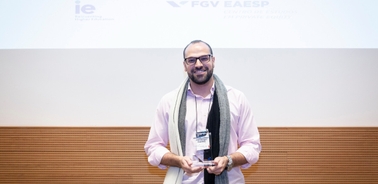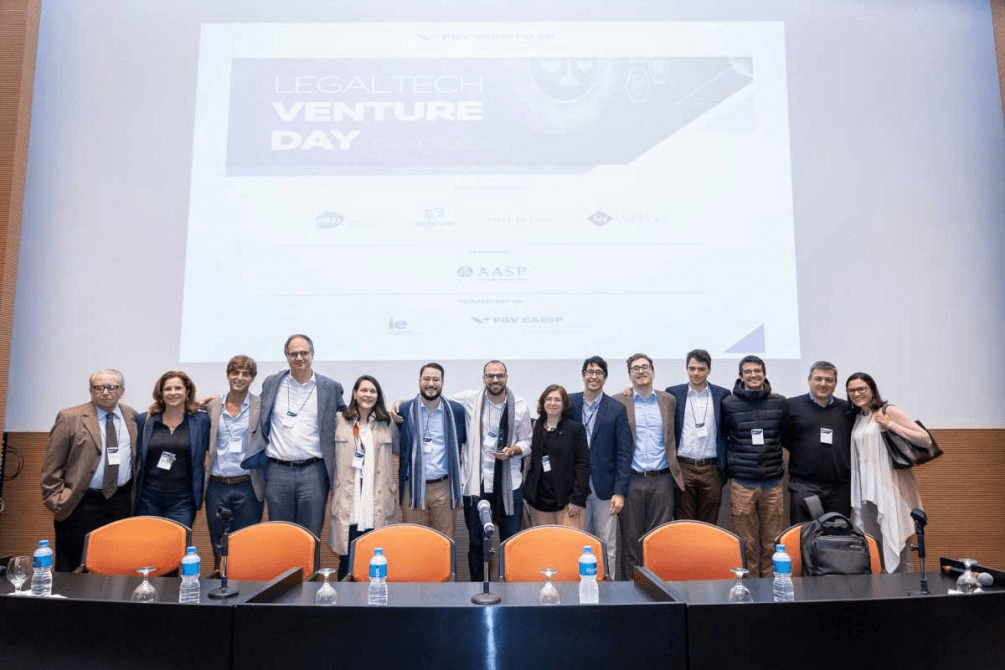- Home
- We Are Law School
- News
- Juit: When Entrepreneurial Vision Meets Legaltech Expertise
JUIT: When entrepreneurial vision meets Legaltech expertise

What happens when an unstoppable entrepreneurial ambition is combined with expert Legaltech insights? We sat down with Deoclides Neto, Founder and CEO of JUIT and winner of September’s Legaltech Venture Day – São Paulo, to learn more about what’s behind this entrepreneur’s unique vision.

He was a trainee at a digital law firm while he studied law but unfortunately lost his job just one month after graduating. Shifting his career focus to the digital world, Deoclides began working as a data analyst for a marketing agency, measuring social media and website metrics. Three years on, the law firm he worked for previously got in touch to ask him to lead a technology project they were working on for a presidential campaign.
“We used to monitor influencers to detect fake profiles and fake news sources, pursuing civil liability for the perpetrators. The results were so positive that we broadened it into every sector for our clients, mainly focusing on brand protection,” he recalls.
Going on to lead the tech department of an investment fund, his primary focus was on legal cases like bankruptcy or asset discovery. Five months later, JUIT��—his “side venture”—was ready to become a successful, disruptive company.
Deoclides, winner of the Legaltech Venture Day Sao Paolo, spoke to us about the challenges every entrepreneur faces, the value he sees in JUIT and his plans for expansion into other markets.
What led you to start this business? How did you come up with the idea?
While I was trying to create products that would help scale my team’s growth at the law firm where I worked, I realized that productivity is a huge problem in the legal sector. I felt that technology can be leveraged to solve this problem. However, the partners wanted to work more as a service-offering consultancy, which in my view didn’t have the same potential for scale. And then suddenly it was crystal-clear to me—I had to dedicate myself to this area.
Late one night, working on my laptop, I had a "eureka” moment. I realized that I could use social network data as a basis to model data from the legal domain. This became what is now our search platform. This idea didn't make much sense to anybody until the first draft of our database was ready. However, when I presented it to some co-workers, the response was, "Wow, what’s that? This is much easier to understand than what I'm used to." They also understood that this meant they could make data-driven conclusions based on responses to database questions.
I discussed it with my friend Marcio—who today is my partner, as well as the co-founder and CTO of JUIT—and he decided to join the project, to transform the draft of a database into a fully functional application. Then, we both decided to leave our jobs to focus solely on this project, and JUIT was born.
“I want JUIT to be recognized as a leader in its industry, changing the way law and lawyers are perceived today”.
What is the problem you solve?
In a country with almost 100 courts, we drastically reduce the time spent on the legal research process by creating a single model of legal data and centralizing verdicts from thousands of judges. We also deliver legal analytics without the hassle of being briefed about the problem the client is facing; the data model we've crafted can answer the real legal question.
What is the biggest challenge an entrepreneur faces in the early stages?
The path to building a company is full of obstacles. That's why it's tough to name a single hardest part. With that said, I can think of two main challenges: credibility and work-life balance.
Regarding credibility, when you have a very innovative product, nobody will believe you until you have your first client. Nobody wants to take the risk of buying something that no one else has bought before—it's too risky. After you have that first client, people may have a more positive attitude toward your business. From there, things tend to get better.
In terms of work-life balance, I think that when you’re an entrepreneur, you should be working relentlessly to build a great company. While you do that, the people around you are the ones who miss you the most.
You’ll miss birthdays, holidays, weekends, celebrations and many other things, but that’s just the way it is. You don't build a company from the ground up by working nine to five. But you have to stay focused, believing that one day, your hard work will pay off. You have to hold on to something and believe firmly that you’ll make it. That process hurts a lot of people close to you, so finding a balance is tough.
Many people say that entrepreneurship is a lonely career path, and I tend to agree with that. Only you will know what it takes to get there—it's a painful process.
What is the value proposition of JUIT?
Our value proposition is to enable legal practitioners to work smarter, using technology as a bridge that will ease their work.
Our goal is to organize judicial information in a way that nobody has done before, creating a universal legal data schema that takes aspects from every legal system into account. We’re on a mission to help lawyers make data-driven decisions. The legal sector is full of strong opinions that lack sufficient proof or evidence. We want to eliminate uncertainty from the equation, while making the judiciary a bit more transparent at the same time.
Is it scalable? Would you like to scale it to other jurisdictions?
It's hugely scalable—many countries have similar legal systems based on common or civil law, for example. Once we scrape data from the courts, our algorithms classify and organize them based on proprietary NLP (natural language processing) pipelines, recommending to users only the verdicts relevant to their cases. So they can find what they need in minutes instead of hours.
We certainly want to scale to other jurisdictions. Spain has a very similar legal system to Brazil’s, and while the US has a different system, NLP algorithms work better in English than in any other language. The US is, of course, the country with the highest lawyer headcount in the world, so it inevitably stands out as a distinctive place to fix. So yes, we intend to expand our operations once we’ve established our presence in Brazil.
Tell us about the technology behind your startup.
JUIT uses powerful technology to deliver a great experience in easy-to-use applications with the strong appeal of modern UIs.
The backend consists of scrapers, parsers, and four complex databases in sync. We start collecting verdicts from many courts with Python and Go crawlers. We then throw the data into a non-relational document database to keep the raw data intact. Then, raw data goes through an 11-step transformation pipeline, becoming a colossal knowledge graph, searchable in every aspect—topic, keyword, judge’s name, court, case number, and many others.
After preparing the backend, we present data in a modern, React-built interface, which communicates with our databases through GraphQL API's, spread across various microservices. All our servers are in the cloud, in containers that we can distribute and organize through Kubernetes.
As we use open-source technologies from Google and Facebook, everything performs extremely well—we query more than 20 million verdicts and deliver results in about half a second. And the core algorithms (classifiers and NLP) are all built in-house, independent of external technology, so we can continue to be vendor-independent, and control the cost of our product without external interferences.
This complex architecture was designed by our DevOps wizard and CTO, Marcio.
How do you define success for this business?
Success for JUIT is to achieve its goal and mission—making a lawyer's life as easy as asking their smartphones how judge "X" usually rules cases on topic "Z", and what the exceptions are, enabling them to build a better case.
How do you define success for yourself?
For me, success is having a hugely positive impact on people's lives by building a company with proprietary technology that generates revenue from day one, delivering value to both users and investors. I want JUIT to be recognized as a leader in its industry, changing the way law and lawyers are perceived today.
JUIT, as a winner of the Legaltech Venture Day – São Paulo, will be invited to participate at the Global Legaltech Venture Day final, taking place in Madrid in spring 2020. All seven winning startups will present their projects to a mix of investors, business pioneers, and representatives of the industry.
Each winner will also gain exclusive access to real networking and investment opportunities that can push their startups to the next level, benefiting from the global network of the Law School’s Global League, IE, South Summit and partner institutions. “Thaw” will be part of a four-day acceleration program at the IE University Entrepreneurship Center, in order to prepare their pitch for the South Summit.
South Summit is southern Europe’s leading event for the world’s most innovative entrepreneurs with the most important investors from around the globe, as well as top corporations seeking to improve their global competitiveness through innovation. More than 650 investors, 3,000 startups and over 12,500 attendees participate.
